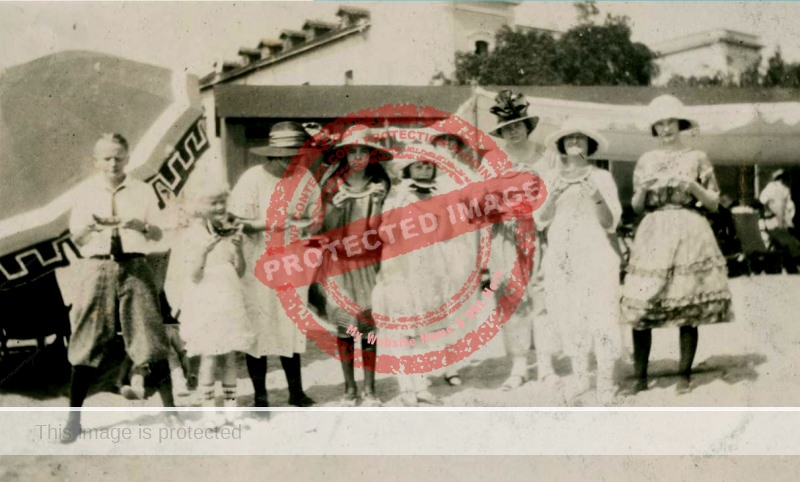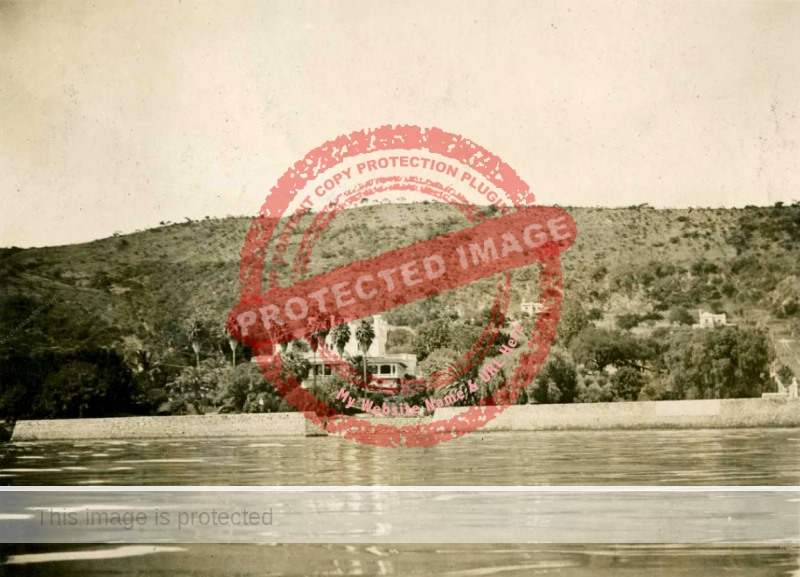Mary Helen Creighton, usually known simply as Helen Creighton, was born into an upper-class family in Dartmouth, Nova Scotia, on 5 September 1899, and became one of Canada’s most prominent folklorists. Her career spanned sixty years, and she gained an international reputation in the field.
After gaining a diploma in music from McGill University in 1915, and graduating from the Halifax Ladies’ College in 1916, Creighton worked as a driver with the Royal Flying Corps in Toronto, and as an ambulance driver for the Red Cross Caravan in Nova Scotia. After completing a course in social work at the University of Toronto, Creighton then traveled to Mexico for a year, where she visited her brother, living in Mexico City, and taught at the American School of Guadalajara.

Helen Creighton and friends, Chapala, 1923: Robert Pierce, Margaret Pierce, Lily, Pauchi, Betty, Mrs Bremer, Mrs Neal, Helen Creighton, Dora. Credit: Nova Scotia Archives.
Creighton arrived in Mexico from Cuba in 1922 and taught most of 1923 at the American School of Guadalajara. A keen photographer, Creighton’s snapshots from her time in Mexico can be viewed on the website of Nova Scotia Archives. In early April 1923, the local Guadalajara daily noted that “Miss Helen Creighton has returned to Guadalajara after spending a very pleasant week with her brother, Dr Creighton of Mexico City.” Two weeks later, she was listed among attendees at the large Rotary Club party in the city.
The exact dates of her visit (or visits) to Lake Chapala are unknown, but all her photographs of Chapala are dated 1923, and they were almost certainly taken within a few weeks of when D H Lawrence arrived at the beginning of May. Photographs taken by Creighton at Chapala show her friends, boats the beach, and a view of the Villa Montecarlo from the lake. Her captions name various people, including a second Helen, Dora, Josie, Lily, Betty, Robert Pierce, Margaret Pierce, Lily, Pauchi, Mrs Bremer and Mrs Neal, most of whom are presumed to have been administrators or fellow teachers at the American School.

Helen Creighton. Villa Montecarlo, 1923. Credit: Nova Scotia Archives.
On returning to Canada, she began a broadcasting career as “Aunt Helen” and read children’s stories on radio CHNS Halifax. In 1928, Dr Henry Munro, the Superintendent of Education for Nova Scotia, urged her to find and record more local stories and songs. This was the start of her passion as a folklorist. Creighton became an intrepid traveler, hiking or sailing, carrying her melodeon (button accordion) to the remotest parts of the province, in search of new material. Before the development of audio tapes, she used wax cylinders and acetate disks to record music and songs in situ. She also investigated and wrote about ghosts, superstitions, witchcraft and buried treasure.
Though Creighton was awarded numerous honorary doctorates and the Order of Canada, her work was not without its critics. Some claimed that her song selections and editing were flawed; others argued that she could never escape her privileged background, and that her collections helped commodify Nova Scotia tourism literature which highlighted its ‘Scottishness’ and the myth of ‘hardy fisherfolk.’
Creighton’s books include Songs and Ballads from Nova Scotia (1932), Bluenose Ghosts (1957), Maritime Folk Songs (1962), Gaelic Songs in Nova Scotia (1964), Bluenose Magic (1968), Folksongs from Southern New Brunswick (1971), A Life in Folklore (1975), Eight Ethnic Songs for Young Children (1977), Nine Ethnic songs for Older Children (1977), With a Heigh-Heigh-Ho (1986) and La Fleur du Rosier (1989). Published recordings included Folk Music from Nova Scotia (1956) and Maritime Folk Songs (1962).
Helen Creighton, author and pioneering folklorist, and subject in her lifetime of three documentaries—Songs of Nova Scotia (1957), Land of Old Songs (1960) and Lady of the Legends (1966)—died in her native town of Dartmouth on 12 December 1989.
An extensive collection of materials related to Creighton’s personal life, and her career as an outstanding author and folklorist, is held by the Nova Scotia Archives.
Acknowledgment
- I am grateful to the Nova Scotia Archives for permission to reproduce these images.
Sources
- Creighton collection at the Nova Scotia Archives
- El Informador: 4 April 1923, 6; 19 April 1923, 1, 8.
Comments, corrections or additional material related to any of the writers and artists featured in our series of mini-bios are welcomed. Please email us or use the comments feature at the bottom of individual posts.